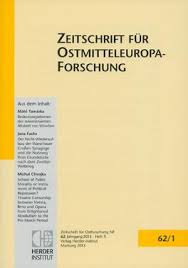Die Sowjetunion im öffentlichen Diskurs Litauens 1939-1940
The Soviet Union in Lithuania 's public discourse, 1939-1940
Author(s): Tobias PrivitelliSubject(s): Political history, Social history, WW II and following years (1940 - 1949)
Published by: Verlag Herder-Institut
Keywords: Soviet Union; Lithuania 's public discourse; 1939-1940;
Summary/Abstract: On October 10, 1939, Lithuania was forced by the Soviet Union to sign a treaty of mutual assistance which allowed the Red Army to station 20 000 soldiers on her territory. The Kremlin sweetened this bitter pill by partly ceding the Vilnius region which had been occupied by Poland for the last 19 years. So when the Lithuanian delegation returned from signing the agreement in Moscow, they were celebrated as heroes and the people welcomed the end of a period “without capital”, the national trauma of the Inter-war years. But soon gags came in circulation such as „Vilnius is ours, we are Russia’s“ (“Vilnius - müsy, mes - rusą”). This contribution deals with the image of the Soviet Union in the Lithuanian public during the year before the annexation. Of particular interest is the question whether the Soviet Union was perceived as a menace. The last period of Lithuania’s independence between the two world wars was characterized by a certain pluralism since the loss of the Klaipeda region and other political failures forced authoritarian President Smetona to build a coalition cabinet and to allow a greater degree of freedom of speech. So despite censorship the press represented different views and social milieus. While nationalist and Christian democrat publications had a rather critical view of the Soviet Union, left-wing newspapers emphasized her progressiveness. During the Soviet-Finnish War the public became even more sceptical because it demonstrated what would have happened to Lithuania if it had not signed the mutual assistance treaty. Moscow, while repeatedly declaring it would not interfere into internal affairs of the Baltic States, encouraged the local Communists in early spring 1940 to organize mass demonstrations on May 1. The Lithuanian press - trying to distinguish between the friendship with Moscow and the fight against local Communist “gripers” - reacted roughly to the new activism and branded the Communist sympathizers as traitors. Lithuania’s society and government were astonished to learn that Moscow from May 1940 onwards did not tolerate any criticism of pro-Soviet exponents in Lithuania. Hence, confronted with Soviet reproaches the government suddenly took strict control of all public statements on the Soviet Union. When the Soviets claimed the kidnapping of Soviet soldiers by Lithuanians, the press was not allowed to inform the public about it. As Lithuanian historiography proved these claims were groundless pretexts. Nevertheless, in the negotiations prior to the Soviet ultimatum of June 14, 1940, the Kremlin accused the Lithuanian press of engaging in anti-Soviet propaganda and the Lithuanian people of harbouring anti-Soviet resentments which culminated in kidnappings. In the decisive days of mid-June 1940 people were not informed about Soviet-Lithuanian relations and the looming loss of sovereignty. By the means of its ultimatum, the Soviet leadership imposed the establishment of a pro-Soviet puppet government. Thus, the Soviets achieved what their plans had foreseen: An irritated government, a controlled press and an ill-informed public were surprised by the Soviet takeover.
Journal: Zeitschrift für Ostmitteleuropa-Forschung
- Issue Year: 55/2006
- Issue No: 2
- Page Range: 194-231
- Page Count: 38
- Language: German

